- Home
- Lauren Oliver
Vanishing Girls Page 8
Vanishing Girls Read online
Page 8
Standing a short distance away is a couple I recognize from the news as the Snows. The man looks like he’s been standing all day in a raw wind: his face is red, chapped, and bloated-looking. The woman is swaying on her feet and keeps one hand gripped, clawlike, on the shoulder of a blond girl standing in front of her. Madeline’s older sister, Sarah. Next to her is Kennedy, the best friend. She has dark hair cut in a severe fringe across her forehead, and she’s wearing a bright-red tank top that looks surprisingly cheerful given the occasion.
I arrived early, when the crowd was thinner, and a few dozen people were milling around, keeping a careful distance from the yellow police tape marking off the scene of the disappearance. We all had to sign in, like we’re guests at someone’s really awful wedding. I’ve watched enough Law & Order to know the cops are probably hoping the pervert—if there is a pervert—will show up to get his rocks off and smirk about being smarter than the cops.
Reflexively I fish my cell phone from my bag. No further word from Nick. No texts from Parker, either. I’m not surprised, but I still get a little dip of disappointment in my stomach, like going over a hill too fast.
“This is how it’s going to go. We’re going to move east in a line. You should be close enough to touch your neighbors’ shoulders.” The cop holds out his arms like a drunk trying to steady his balance on the line. “Keep your eyes on the ground and look for anything and everything that doesn’t belong. A barrette, a cigarette stub, a headband, whatever. Maddie had a favorite bracelet—silver, with turquoise charms. She was wearing it when she disappeared. If you see something, give a shout.”
He hops off the concrete divider, and the crowd responds like a uniform pool of water, rippling outward, dispersing, breaking apart into smaller groups. The search party fans out across the beach, while cops shout orders and instructions and the camera crews click and buzz away. From above we might look like we’re playing a complicated game, an intricate pattern of Red Rover, all of us spread out in a line and silently calling for Madeline to come over, to come back. The sand is studded with the kind of trash that accumulates at the edge of parking lots: pulpy cigarette packs, plastic wrappers, soda cans. I wonder whether any of it is important. I imagine a featureless man sitting outside on Friday night, sipping a warm Coke, watching the firefly flicker of taillights in and out of the Big Scoop parking lot, watching two girls, Kennedy and Sarah, walking with their arms linked to the warm bright glow of the ice-cream shop, leaving a small girl huddled in the backseat.
I hope she’s alive. Even more: I believe. It strikes me that that’s the point of the search party. Not actually to turn up clues, but as if the power of our collective belief, our joint effort, will keep her alive. As if she’s Tinker Bell, and all we have to do is keep clapping.
At least it’s a little cooler when we move down toward the water, but the mosquitoes and the horseflies are worse, swarming up from hidden pockets and piles of beach wood. The going is painfully slow, but even so, moving across the sand is exhausting. Every few minutes someone shouts, and the cops rush over and squat, prodding at some garbage with long, white-gloved fingers: a tattered piece of fabric, an empty beer can, the remains of somebody’s fast-food lunch, probably chucked out of a passing car. The cops bag a silver bracelet, though I see Madeline Snow’s mother shaking her head, lips pressed together. The beach is barely a quarter mile wide; at no point are we out of sight of either the parking lot or the houses and motels perched high on the dunes. It seems impossible to imagine that anything bad could happen here, in this short strip of land, so close to the everyday churn of cars and restaurants and people sneaking outside to smoke cigarettes on the beach.
But something bad did happen here. Madeline Snow is gone. Nick and I used to pretend that there were goblins waiting in the woods; she told me that if I listened hard enough, I could hear them singing.
If you don’t watch out, they’ll grab you, she’d say, tickling me around the middle until I shrieked. They’ll take you to the underworld and turn you into a bride.
And just for a second, I imagine Madeline vanishing into thin air, lured by a song too soft for the rest of us to hear.
“You’re Sharon Warren’s daughter, aren’t you?” the woman on my left blurts out. She’s been blatantly staring at me for the past ten minutes, and I’ve been doing my best to ignore her. Her face is sugared with too-heavy makeup, and she’s been tottering along in wedge heels over the sand, windmilling her arms like she’s on a balance beam.
I almost deny it but decide there’s no point. “Uh-huh.”
“I’m Cookie,” she says, blinking at me, as if expecting me to know her. Of course her name is Cookie. No one who wears bright-pink lipstick and heels to search for a missing girl could possibly have any other name. “Cookie Hendrickson,” she adds, when I say nothing. “I live in Somerville, too. I did admin at MLK High when your mom was principal there. I knew your grandfather, too. Great man. I was”—she lowers her voice as if she’s telling me a secret—“at the funeral.”
Last December, three days after Christmas, my grandfather died. He’d lived in Somerville all his life and, in fact, worked for two summers for the last mill before it got shuttered in the fifties. Later on he coached Little League and even briefly got elected town chairman, a position he abdicated as soon as he, and the rest of town, realized that he didn’t give a shit about politics. Nick and I called him Paw-Paw, and half of Somerville was at his funeral in January. Everybody loved him.
Later that night Nick, Parker, and I got blitzed on SoCo in Parker’s basement. Nick went upstairs to get water, and I started crying, and Parker put his arm around me and I kissed him. When Nick came downstairs again she made the funniest face, like she’d just walked into a party where she didn’t know anyone.
Still, Nick and I slept together that night, side by side, the way we did when we were kids. It was the last time.
“How’s your mama doing?” She’s putting on the accent real thick, like we’re in Tennessee. Women do that, I’ve noticed, when they’re about to say something you won’t like, like dropping all the consonants makes it harder to hear what they’re saying. Sugared face, sugared words. “I know she went through a little . . . depression.” She says it like it’s a bad word.
“She’s fine,” I say. We’ve stopped moving again. We’re almost at the water now. The ocean shimmers like metal just beyond a short, dark strip of wet sand. A woman—a reporter?—has taken an interest in our conversation. She starts edging toward us, clutching a mini tape recorder. “We’re all fine.”
“That’s good to hear. You tell your mama Cookie says hello.”
“I’m sorry to interrupt.” The reporter has reached us and, without acknowledging Cookie, shoves her iPhone in my face, looking not at all sorry. She’s overweight, wearing a nylon suit with big sweat marks soaking the underarms. “I’m Margie. I work for the Shoreline Blotter.” She pauses, as if expecting me to applaud her. “I was just hoping to ask you a few questions,” she adds, when I say nothing. Cookie lets out a little chirp of surprise as the reporter, undeterred, steps in front of her, effectively blocking Cookie’s view.
“Aren’t you supposed to be doing something useful?” I cross my arms. “Like interviewing the Snows?”
“I’m looking for a variety of human interest stories,” she says smoothly. She has big eyes, weirdly protruding, and she doesn’t blink very much, giving her face the impassive look of a particularly stupid frog. But she’s not stupid. That I can tell right away. “I live just outside Somerville. You’re from Somerville, is that right? You were in that terrible accident. It wasn’t that far from here, was it?”
Cookie makes a disapproving noise. “I’m sure she doesn’t want to talk about all that,” she coos, but with a wink in my direction, as if she’s hoping I will anyway.
Sweat is moving freely down my back by now, and the horseflies are fat, droning in thick clusters. Suddenly all I want is to strip down and get clean, scrub off this day,
scrub off Cookie and the reporter with her reptilian eyes, watching me lazily as if I’m an insect she’s waiting to swallow.
Down the beach, the cop who looks like a dad is waving his arms and shouting something I can’t hear. But the gesture’s clear enough. We’re done here, he’s saying. Pack up and go home. I feel an immense, overwhelming surge of relief.
“Look,” I say. My voice sounds high-pitched, foreign, and I clear my throat. “I just came to help out, like everybody else. I really think we should, you know, keep the focus on Madeline. Okay?”
Cookie murmurs something that manages to sound both appreciative and disappointed. The reporter, Margie, is still standing there clutching her stupid iPhone like it’s a magic wand. I turn around and start moving back toward the parking lot, as the crowd disperses into smaller groups, everyone speaking in low tones, reverent almost, as if church has just finished and we’re afraid to use our regular voices too soon.
“What do you think happened to Madeline Snow?” Margie calls after me, her voice loud and easy—too easy.
I freeze. It might be imagination, but I imagine that the crowd freezes too, that for a second the whole day stills and becomes a picture, filter: sepia, a whitewash of grays and yellows and a flat silver sea.
I turn around. Margie is still watching me, unblinking.
“Maybe she just got tired of everyone bothering her,” I say. My throat is raw from the heat and the salt. “Maybe she just wanted to be left alone.”
http://www.theShorelineBlotter.com/home
WE NEED YOU!
Sign Our Petition and Join the Fight for Safer Streets!
On Sunday, July 19, nine-year-old Madeline Snow was abducted from her sister’s car just outside the Big Scoop Ice Cream & Candy Shop, a Shoreline County institution. This follows a year in which police budgets were slashed by 25 percent county-wide, leaving many police departments understaffed and underfunded.
Police commissioner Gregory Pulaski has spoken up about the need to demand that the state legislature expand the police budget to prerecession levels: “When times are hard, people get desperate. When people get desperate, they do desperate things. In order to function efficiently as a unit, we need to expand our presence on the streets, develop our training programs, and recruit and keep the best men and women for the job. That costs money. Period.”
Join the fight to secure safer streets. Sign the petition below, and demand that the General Assembly take action.
Sign the Petition!
Enter full name:
Enter zip code:
SUBMIT
Glad someone is finally taking action. Forwarded to everyone I know. Let’s hope the town actually listens.
posted by: soccerdadrules at 6:06 p.m.
25 percent?? No wonder there’s graffiti all over my neighborhood.
posted by: richardthefirst at 7:04 p.m.
Graffiti isn’t a crime. It’s an art form, dickwad.
posted by: iambanksky at 8:55 p.m.
How many more children will have to disappear before Congress takes note? Poor Maddie. And poor Sarah! I can’t imagine how devastated she must be.
posted by: mamabear27 at 12:00 a.m.
Sarah Snow is a liar.
posted by: anonymous at 1:03 a.m.
JULY 22
Dara
I make it back to the parking lot without seeing the reporter again, thank God. Still no texts from Parker, and no word from Nick, either. Just a creepy text from a number I don’t recognize.
Yo. WTF. Tried calling. R u dead?
I delete the text without replying. Probably some asshole I made out with once.
My whole body feels filmy with sweat, and my legs are killing me. I half jog, half wobble across the street to the gas station. I buy a Coke and chug it in basically a single gulp, then lock myself in the bathroom, which is surprisingly clean and as cold as a meat freezer. I splash water on my face, dampening my hair and shirt in the process and not even caring. I towel off with the scratchy brown paper towel unique to public restrooms, the kind that smells like wet earth.
I try not to look too long in the mirror—funny how I used to like to look at myself, could stand for hours with Ariana at my mom’s vanity before we went out, comparing lip and eye shades and making funny faces—and sweep my hair over my right shoulder, which helps conceal the scars below my jawline. There’s nothing I can do about the scars on my cheek and temple, although I half wish I had Nick’s hoodie again.
Already I feel better. Still, I spend some time rifling through the rack of weird miscellaneous crap all gas stations sell: Christian rock CDs, sun visors, plastic razors. When Parker first got his license, six months before Nick, we used to play this game where we’d all pile into the car and hit up the local pawn shops and gas stations, competing over who could find the weirdest items for sale. One time at a Gas ’n Go he found two old beanbag toys, fur clotted with dust, stuffed behind a row of condoms and energy-pill bottles. Nick got the horse because she used to ride, and I got the bear, which I named Brownie.
I wonder whether he remembers that day.
I wonder what he would think if he knew that Brownie still sleeps with me every night.
The parking lot across the street is now mostly empty, and both the cops and the news vans have dispersed. The sun is hovering low over the trees, and I can see stretches of the bay lying puddle-like between the clutter of businesses and condos.
When I step outside, I’m surprised to see Sarah Snow standing a few feet away, angled behind a big SUV, smoking a cigarette with hard, rapid pulls. She starts when she sees me, dropping her cigarette. Then, after a momentary hesitation, she comes toward me.
“Hey.” She brings her hand to her mouth quickly, then drops it, as though still smoking a phantom cigarette. Her fingers are trembling. “Don’t I know you?”
Whatever I thought she might say, it wasn’t that. I shake my head. “I don’t think so,” I say.
She keeps watching me. Her eyes are huge, as if she’s not seeing but actually devouring me through her eyeballs. “You look familiar.”
Even though it’s a long shot, I say, “Maybe you know my sister?”
“Yeah.” She starts nodding. “Yeah, maybe.” She looks away, squinting, wiping her hands on the back of her jeans. The seconds tick on. I wonder what it would be like to have to be here, on the beach, surrounded by strangers, holding hands with some sweating neighbor and calling for your sister to come home.
“Listen,” I say, fighting a sudden feeling of suffocation. I was never good at this: words of comfort or hope. “I’m really sorry. About your sister. I’m sure . . . I’m sure she’s okay.”
“You think?” When she turns back to me, her face is so raw, so full of grief and fear and something else—anger—I almost turn away. But then she steps forward and grabs my wrist, squeezing so hard I can feel the impression of each individual finger.
“I was trying so hard to protect her,” she says, speaking in a sudden rush. “It’s all my fault.” She’s so close I can smell her breath, sour, stinking of tobacco. “The lying is the hardest part, isn’t it?”
“Sarah.” Across the street, Kennedy is standing at the edge of the parking lot, holding a hand to her eyes to shield them from the sun. She’s frowning.
Once again, Sarah’s face transforms. Before I can respond, she releases me, spinning around, her blond hair fanning behind her shoulder blades, trailing the faint smell of smoke.
FEBRUARY 9
Nick’s Gratitude List
Why is it so hard to find five things to be thankful for? It’s only been a month and already keeping a gratitude journal might be the hardest New Year’s resolution I ever made, especially after our crap show of a Christmas. I can think of a billion things I’m not happy about. Like the fact that Dara’s not speaking to me ever since she caught me reading her journal. Or the fact that Mom spends all her time at work. Or the fact that Dad’s new girlfriend always has lipstick on her teeth, even first t
hing in the morning.
Okay, bad start. Here goes. For real this time:
1. I’m grateful that I don’t have lipstick on my teeth, ever, because I never wear any.
2. I’m grateful for the Toyota Dad got me! Okay, it’s like twenty years old and Parker says the upholstery smells like cat food, but it drives, and this way Dara and I don’t always have to fight over the keys.
3. I’m grateful for Perkins, my little walking ball of fluffy.
4. I’m grateful that Margot Lesalle started that stupid rumor about what Aaron and I were doing in the boiler room at the Founders’ Day Ball. Thank God for Margot. She always goes for the most obvious rumors.
And:
5. I’m super, extra, mega grateful that no one knows what really happened. That no one will ever know. They say that you’re supposed to tell the truth. Dr. Lichme says that, anyway.
But don’t they also say that what you don’t know can’t hurt you?
BEFORE
FEBRUARY 15
Nick
“Dara!” I paw through the pile of clean laundry on my bed, cursing under my breath. The stuffed cat Aaron gave me for Valentine’s Day—You’re puuurrfect, it says in a creepy high voice when you squeeze it—is perched between my pillows, watching me with glittering glass eyes. “Dara? Have you seen my blue sweater?”
No answer from above: no footsteps, no signs of life. Christ. It’s already after seven o’clock. No way can I be late to homeroom again, not after Mr. Arendale threatened me with detention.
From my closet, I grab a broom—or what was a broom, anyway, before Perkins clawed out most of the bristles—and thump the ceiling with the handle, a method of communication (I’ve found) far more effective than screaming or calling or even texting, which Dara has been known to do when she’s really hung over. (Can u bring up some water? Pleeeeeeease?)
“I know you can hear me!” I shout, punctuating every word with a thwack.

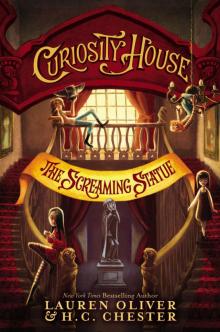 The Screaming Statue
The Screaming Statue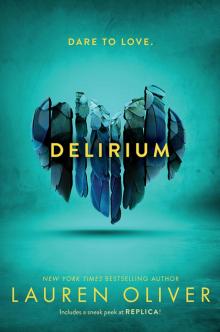 Delirium
Delirium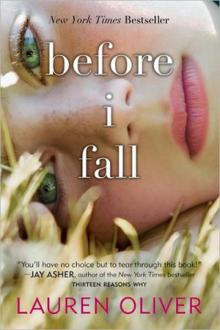 Before I Fall
Before I Fall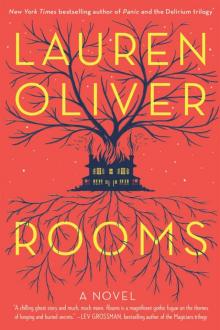 Rooms
Rooms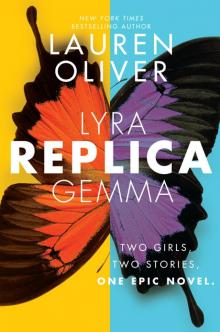 Replica
Replica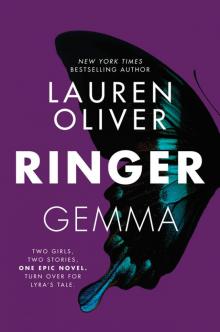 Ringer
Ringer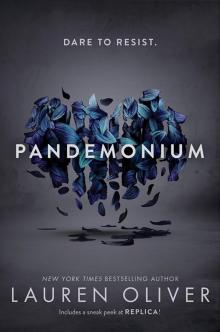 Pandemonium
Pandemonium The Shrunken Head
The Shrunken Head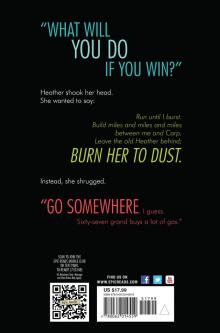 Panic
Panic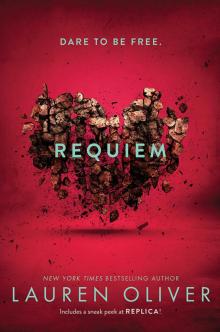 Requiem
Requiem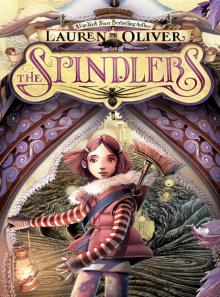 The Spindlers
The Spindlers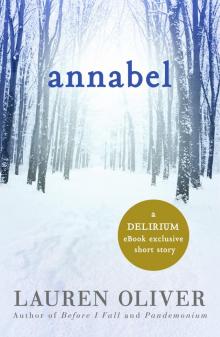 Annabel
Annabel Liesl & Po
Liesl & Po Raven
Raven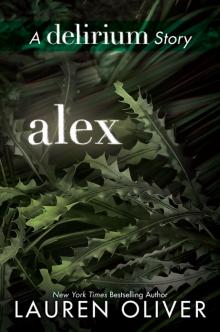 Alex
Alex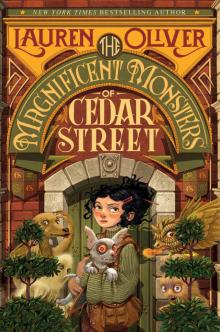 The Magnificent Monsters of Cedar Street
The Magnificent Monsters of Cedar Street Vanishing Girls
Vanishing Girls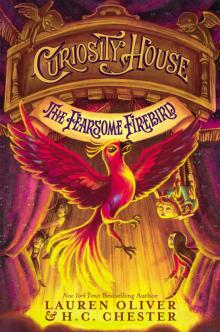 The Fearsome Firebird
The Fearsome Firebird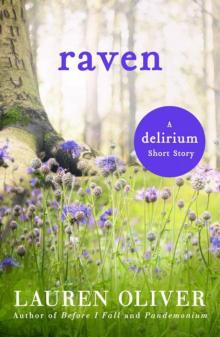 Raven: A Delirium Short Story
Raven: A Delirium Short Story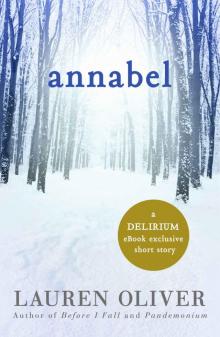 Annabel: A Delirium Short Story
Annabel: A Delirium Short Story Hana: A Delirium Short Story
Hana: A Delirium Short Story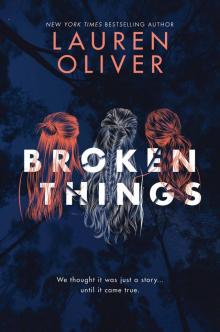 Broken Things
Broken Things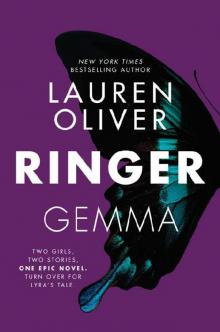 Ringer (Replica)
Ringer (Replica) Alex (delirium)
Alex (delirium)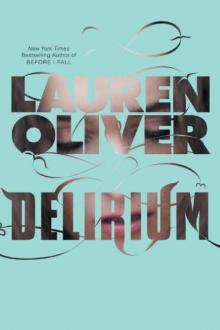 Delirium dt-1
Delirium dt-1